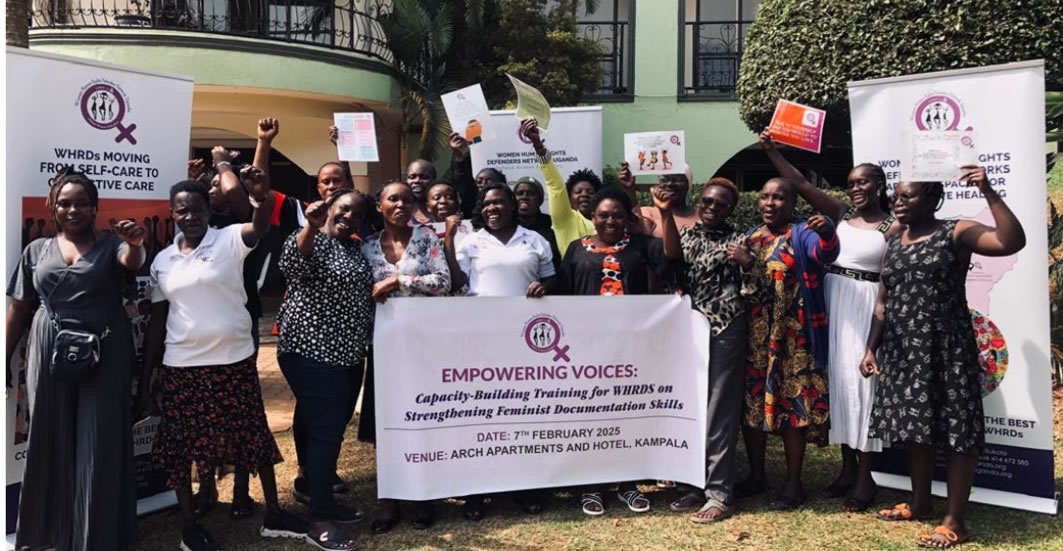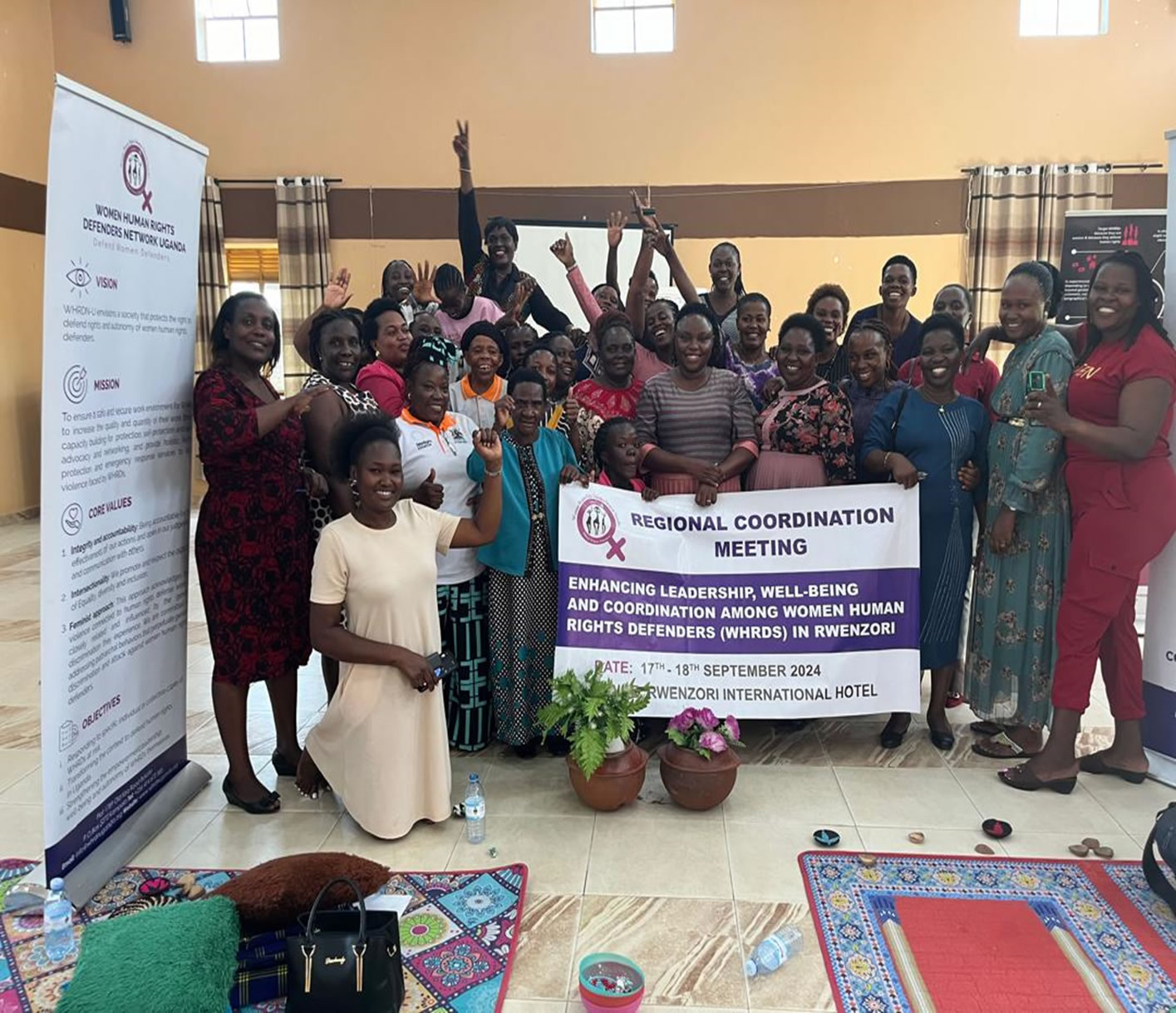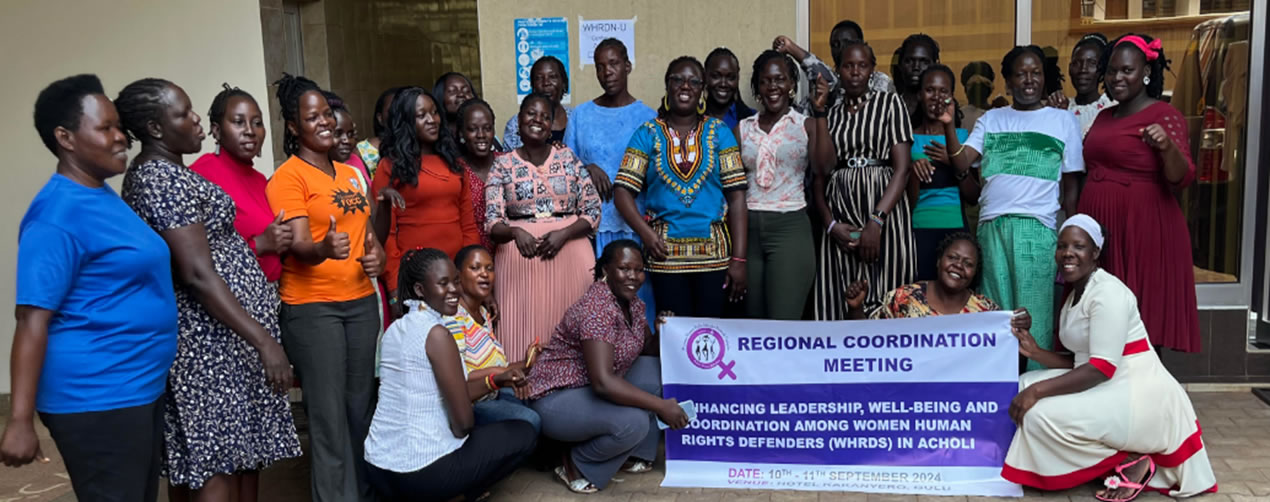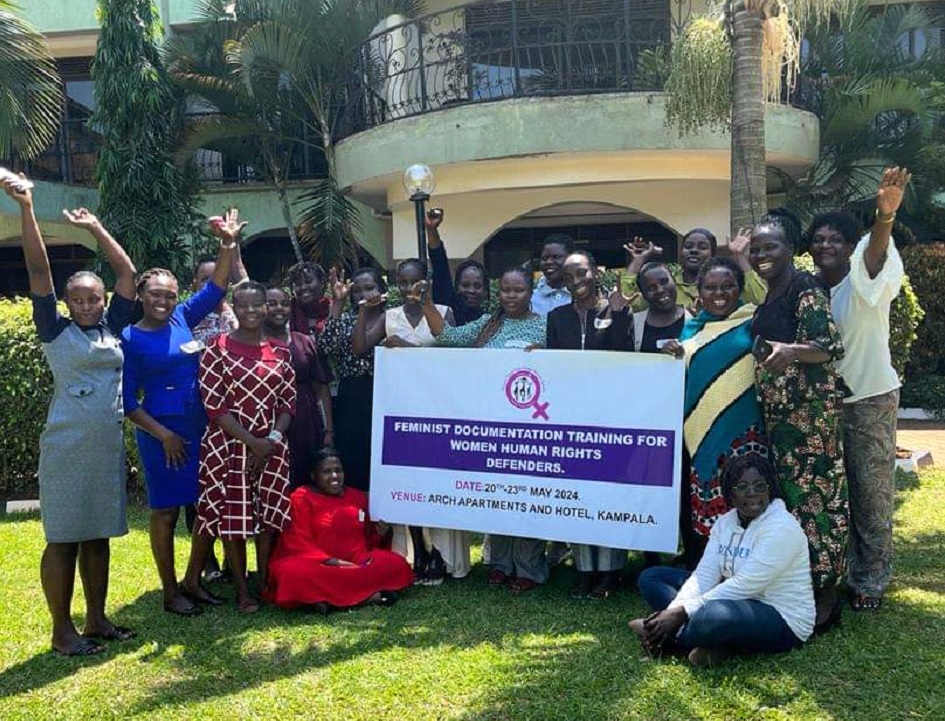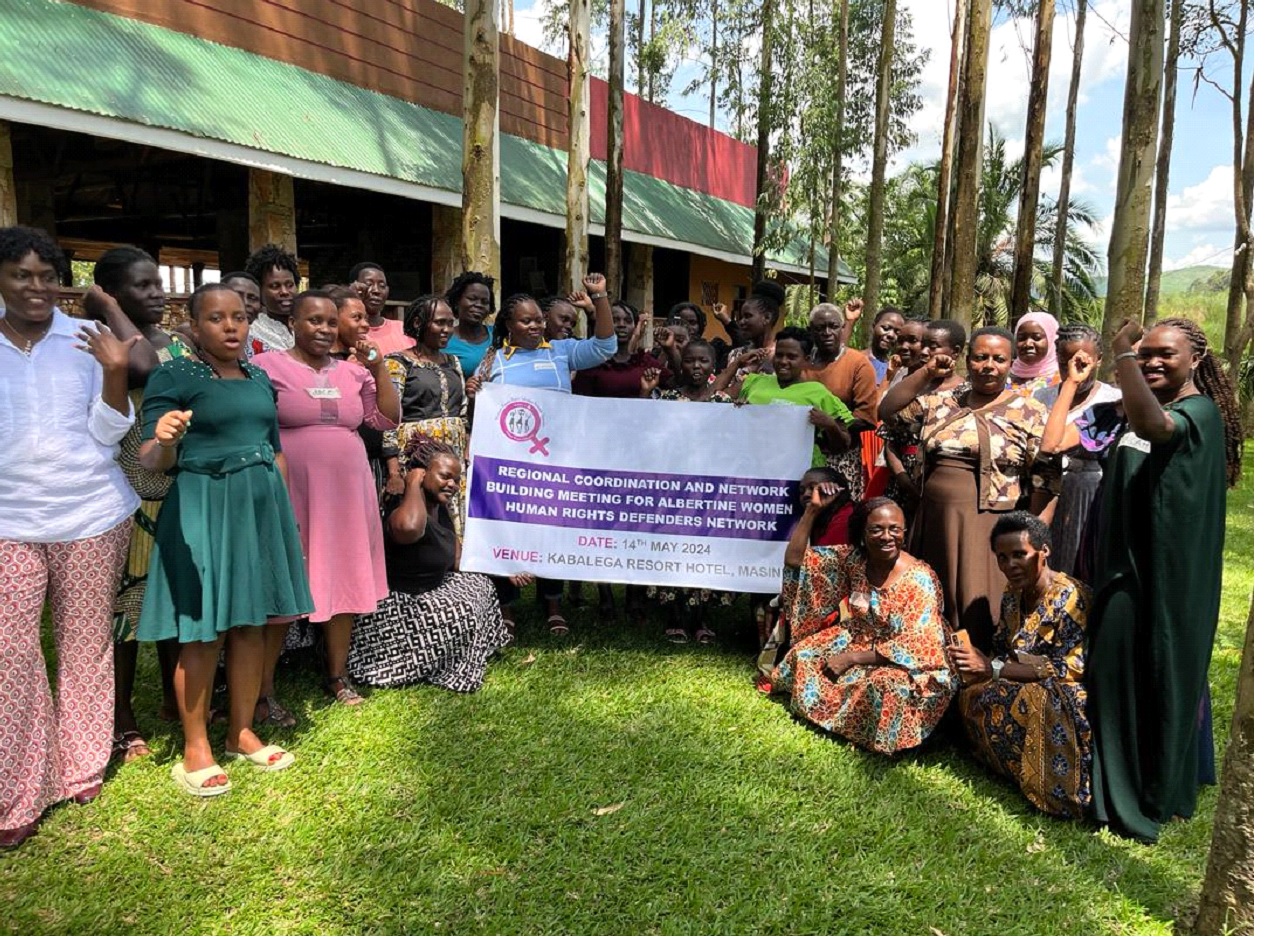March 5-7, 2025 | Esella Country Hotel
The Women Human Rights Defenders Network Uganda (WHRDN-U) successfully concluded a three-day residential capacity building workshop that brought together 25 Women Human Rights Defenders (WHRDs) from Eastern and West Nile regions. The workshop, held at Esella Country Hotel from March 5-7, 2025, focused on improving reporting mechanisms, strengthening evidence-based advocacy, and building stronger alliances among defenders.
Opening Remarks Set the Tone for Solidarity
Executive Director Brenda Kugonza opened the workshop by acknowledging the courageous work of, who advocates for marginalized groups despite facing significant challenges. “We have individuals like her, but we have chosen to render them invisible,” Kugonza noted, emphasizing the need to identify and support active human rights defenders who lack organizational backing.
The opening session also featured powerful testimonies, including Agodo Joroline’s account of being attacked for defending the health rights of sex workers, highlighting the real dangers WHRDs face in their work.
Institutional Engagement: Building Connections with National Protection Mechanisms
Uganda Human Rights Commission (UHRC) Partnership
Director Ruth Ssekindi from UHRC provided comprehensive training on engaging with national protection mechanisms. She emphasized fundamental principles: “Human rights are entitlements that every person has by virtue of being human, such as the right to food, life, speech, worship, water, and the right to receive information.”
The session covered UHRC’s mandate, which includes:
- Conducting civic education and sensitization
- Visiting detention facilities
- Receiving and investigating complaints free of charge
- Monitoring human rights situations nationwide
- Reviewing parliamentary bills for human rights compliance
Importantly, WHRDs learned they can lodge complaints through multiple channels: walk-ins, phone calls, written complaints, and interactions with investigation officers, with all services provided at no cost.
Equal Opportunities Commission (EOC) Collaboration
Monica introduced the Equal Opportunities Commission to participants, with Peace Anirwath from EOC presenting her colleagues, including Counsel Miragi Musena, the Acting Head of Legal Department and Investigations, and Ms. Loyo Susan, who handles EOC inquiries.Counsel Musena provided a comprehensive overview of EOC’s mandate, emphasizing its role in eliminating discrimination and inequalities based on sex, age, race, disability, and other grounds. He clarified an important distinction: EOC is a government statutory body, not an NGO.
The session included concrete examples of EOC’s work addressing unequal treatment:
- Property discrimination cases
- Gender-based inheritance issues
- HIV-related employment discrimination
- A case involving a young girl with albinism who faced discrimination from a school headteacher
Participants inquired about the difference between UHRC and EOC, Counsel Musena explained that while UHRC handles human rights violations (particularly police brutality cases), EOC specifically focuses on discrimination and unequal treatment issues.
EOC’s comprehensive services include issuing court summons, providing mobile legal clinics in underserved communities, offering alternative dispute resolution (ADR) services, conducting public inquiries, reviewing laws, and making policy recommendations. Counsel Musena also highlighted upcoming mobile legal clinics planned for Mityana and Bulisa districts.
Evidence-Based Advocacy: Understanding the Challenges
The workshop examined WHRDN-U’s comprehensive report documenting attacks on WHRDs from 2020-2024. The findings revealed alarming statistics:
Types of Attacks:
- 82% faced cyber harassment including hacking and targeted online violence
- 52% experienced arbitrary arrests in 2020, with 20% in 2024
- 39% received threats and intimidation
- 21% encountered gender-based violence and sexual harassment
Perpetrators Identified:
- Community members (57%) – residents, business owners, and community leaders
- Family members and local leaders (41%)
- Government institutions and private corporations (32%)
- Security forces (26%)
Participants role play how to engage in policy advocacy
Wellness and Collective Care: Nurturing the Nurturers
Recognizing the emotional toll of human rights work, the workshop included dedicated wellness sessions. Executive Director Kugonza personally acknowledged each defender’s contributions while highlighting their challenges:
- Emily Drijaru’s community support work despite facing criticism
- Namaganda Lydia’s dedication to supporting HIV-positive mothers amid financial constraints
- Maimuna Mami’s resilience after being beaten, arrested, and isolated for supporting marginalized communities
- Stella Biryema’s defense of GBV survivors despite personal safety risks
Practical Skills Development
Risk Assessment and Security Planning
Monica led comprehensive security training covering:
Office Security:
- Visitor management procedures and identification protocols
- Physical security measures including cameras, locks, and lighting
- Emergency contact maintenance
- Trustworthy personnel hiring practices
Digital Security:
- Strong password protocols
- Avoiding public Wi-Fi for sensitive work
- Regular file backups
- Mobile phone security measures
Policy Advocacy through Role-Playing
Sarah Namogolo facilitated role-playing exercises where WHRDs practiced presenting reports to policymakers. The simulation included testimonies from defenders about online abuse and unfair arrests, with “policymakers” responding with commitments to support and collaboration.
Network Strengthening and Alliance Building
The workshop emphasized alliance-building as crucial for amplifying WHRD voices. Strategies discussed included:
- Storytelling: Sharing personal narratives to increase visibility
- Social Media Mobilization: Using digital platforms for mutual support
- Media Outreach: Engaging journalists to highlight human rights work
- Solidarity Visits: Supporting fellow defenders facing risks
Concrete Action Plans and Outcomes
The workshop concluded with specific commitments:
- Eastern Region Engagement: Alubo Annet will lead Eastern region members in engaging with UHRC using WHRDN-U policy briefs
- Arua District Outreach: Emily Drijaru will meet with district committee members during a Swedish ambassador visit on March 19, 2025
- Enhanced Security: All WHRDs committed to improving workplace security through stronger passwords and visitor management
- Documentation: Continued case documentation for sharing with the Urgent Action Fund
- Network Expansion: Identifying new WHRDs in communities for database inclusion
Follow-up Success: UHRC Soroti Engagement
The workshop’s impact was immediately evident when Eastern region WHRDs successfully engaged with UHRC’s Soroti regional office on April 11, 2025. Commissioner Akello Josephine welcomed the partnership, acknowledging that she had been unaware of WHRDs in the community and expressing willingness to provide support, especially for vulnerable groups who cannot afford legal representation.
Moving Forward Together
This capacity building workshop represents a significant milestone in strengthening the network of Women Human Rights Defenders across Uganda. By combining institutional engagement, practical skills development, wellness support, and alliance building, WHRDN-U has equipped defenders with essential tools to continue their vital work while better protecting themselves and supporting each other.
The testimonies, learning, and commitments from these three days demonstrate that when WHRDs come together, share experiences, and build collective knowledge, they become more effective advocates for human rights and more resilient in the face of challenges.
As the network continues to grow and strengthen, the impact of this workshop will ripple through communities across Eastern and West Nile regions, ultimately benefiting the marginalized populations these brave defenders serve.
Published by Brenda Kugonza



























